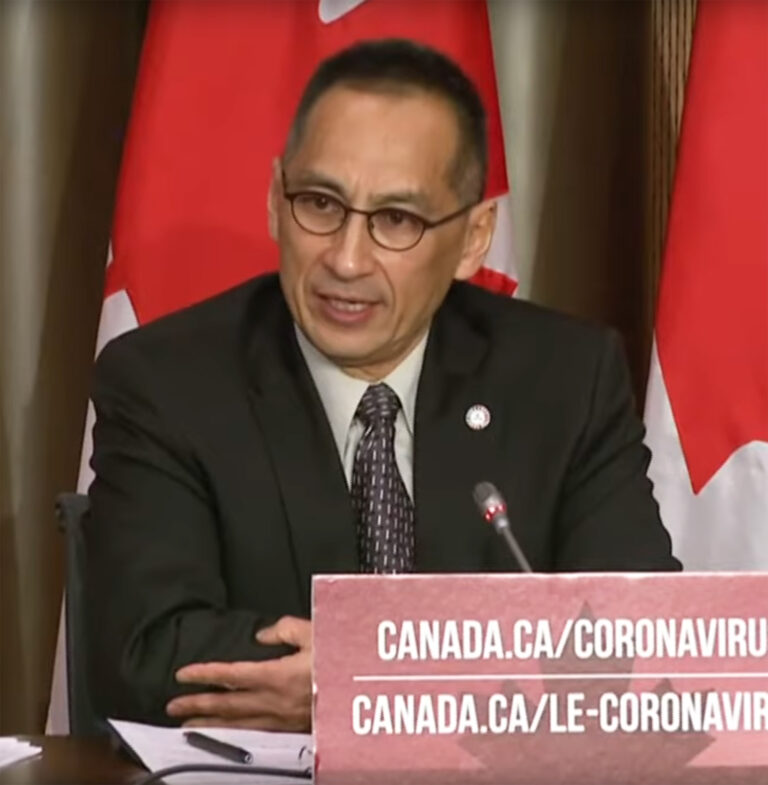
Canada’s deputy chief public health officer thanked essential workers for their efforts over the past 12 months as the country marked one year since the World Health Organization declared COVID-19 a global pandemic.
Dr. Howard Njoo told reporters there are reasons to be optimistic as the country prepares for an increase in vaccine deliveries. However, he also took time to look back at the past year, and acknowledged the efforts made by frontline workers and community leaders.
“COVID-19 has taken a heavy toll on all of us, particularly seniors, those who are marginalized, and frontline healthcare workers,” Njoo said during a press conference on Wednesday. “Today, we take a moment to recognize that essential workers and other leaders in our communities contributing to the national effort to end this pandemic. Better days are ahead.”
Thursday marked one year since the WHO declared a global pandemic. Public health officials focused on reducing the virus’ spread in those early days, but Njoo said they’re now turning their attention to vaccine safety campaigns.
Njoo told reporters he’s concerned many residents do not have access to reliable and accurate vaccine information, especially in minority communities. The government recently set up a Vaccine Community Innovation Challenge that allows residents to submit “proposals for creative and innovative campaigns” that promote confidence in vaccines. The campaign winner will receive a grand prize of $100,000.
Njoo said residents in Indigenous communities may be hesitant to get the vaccine due to past experiences of discrimination or abuse. He’s also concerned there isn’t enough vaccine information in minority languages. He views the innovation challenge as an important tool to getting that information out.
“We want to help communities create their own content in their own languages and formats to help people make informed decisions about COVID vaccinations when their turn comes,” he said. “Every day we continue to learn more about COVID-19 vaccines and the protections that it provides. As more real world data becomes available, our guidance and recommendations will evolve accordingly.”
To date, health offices have administered more than 2.5-million vaccine doses across Canada. Njoo said they’d like to see those numbers increase substantially to help fight off the increasing spread of COVID variants. However, he also hinted that getting vaccinated may not mean an end to public health measures.
“As we approach the one year mark of this pandemic, and people across the country roll up their sleeve for the vaccines, the continuing practices of personal public health measures such as physical distancing, mask wearing and hand-washing, will continue to be important,” he explained. “It may be part of our lives for some time.”
The Public Health Agency of Canada (PHAC) expects vaccine deliveries to ramp up significantly in the coming weeks. The organization held a dress rehearsal on Tuesday with the provinces to prepare for the increased deliveries.
Maj.-Gen Dany Fortin, the PHAC’s vice-president of logistics and operations, told reporters he’s confident they can handle the increase.
“The provinces have assured us they are in a very good position to scale up,” he said on Wednesday.
Vaccine manufacturers have delivered roughly 3.8-million doses to Canada as of March 10. Fortin said he expects to receive 8-million doses total by the end of March.
Pfizer-BioNTech has indicated they will start shipping more than 1-million doses a week starting on the week of March 22. Those deliveries will continue through April.
Fortin said they expect to receive a new Moderna shipment of 466,000 doses on Thursday. Deliveries will start on Friday.
Moderna has committed to sending 846,000 doses the week of March 22, 855,000 doses the week of April 5, and more than 1-million doses the week of April 19.
Canada received 500,000 doses of Oxford’s AstraZeneca vaccine last week. Almost all of those doses have already been delivered. Fortin said they expect to receive another 1-million doses of that vaccine in April.
Delivery details regarding the single-dose Janssen vaccine manufactured by Johnson and Johnson have not been confirmed. Fortin said they’ll notify Canadians as soon as they know the arrival dates.
